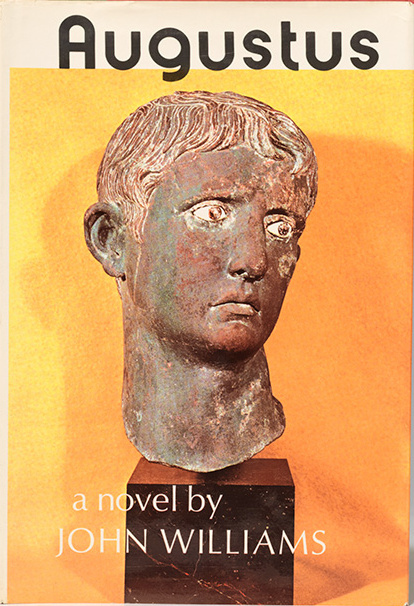Hardcover, 305 pages
English language
Published Oct. 31, 1972 by Viking Press.

Hardcover, 305 pages
English language
Published Oct. 31, 1972 by Viking Press.
It was more nearly an instinct than knowledge, however, that made me understand that if it is one's destiny to change the world, it is his necessity first to change himself. If he is to obey his destiny, he must find or invent within himself some heard and secret part that is indifferent to himself, to others, and even to the world that he is destined to remake, not to his own desire, but to a nature that he will discover in the process of remaking.
— Augustus Caesar (63 B.C.–14 A.D.), the first Roman Emperor
Such are the reflections of a man who, at the end of a long and spectacular life, must search deeply into his soul to find the singularly unspectacular young man he remembers as having first accepted the awesome destiny he would later fulfill—the would-be scholar who suddenly, at the age of nineteen, had literally …
It was more nearly an instinct than knowledge, however, that made me understand that if it is one's destiny to change the world, it is his necessity first to change himself. If he is to obey his destiny, he must find or invent within himself some heard and secret part that is indifferent to himself, to others, and even to the world that he is destined to remake, not to his own desire, but to a nature that he will discover in the process of remaking.
— Augustus Caesar (63 B.C.–14 A.D.), the first Roman Emperor
Such are the reflections of a man who, at the end of a long and spectacular life, must search deeply into his soul to find the singularly unspectacular young man he remembers as having first accepted the awesome destiny he would later fulfill—the would-be scholar who suddenly, at the age of nineteen, had literally inherited the vast Roman world from his assassinated great-uncle, Julius Caesar.
Augustus would rule that world, and rule it astonishingly well, given the odds and intrigues against him. Having vowed to avenge the murder of his uncle, he would raise an army at his own expense and, to establish his base of power, be obliged to put down (by a subtle combination of force and guile) the challenges of such ambitious and conspiratorial men as Cicero, Brutus, Cassius, and finally Marc Antony. The future would hold civil war with Pompey, the pull of Cleopatra's treasures in the East, a dizzying array of marriages and divorces arrange for diplomatic purposes, and the constant travail of setting both Rome and his own house in order.
Perhaps because all of us, too, would like somehow to change the world, John Williams' exceptionally drawn biographical novel intrigues and excites by offering us unexpected and dramatic insights not only into Augustus himself but unto the teeming Empire over which he presided. We see Augustus as his peers—perhaps most important, as his daughter, Julia, the love goddess—saw him; in the end we perceive this rather withdrawn man as he saw himself.
Mr. Williams' research has been impeccable, but it is the finctional mosaic that he has made of that research which brings Augustus so brilliantly to life.